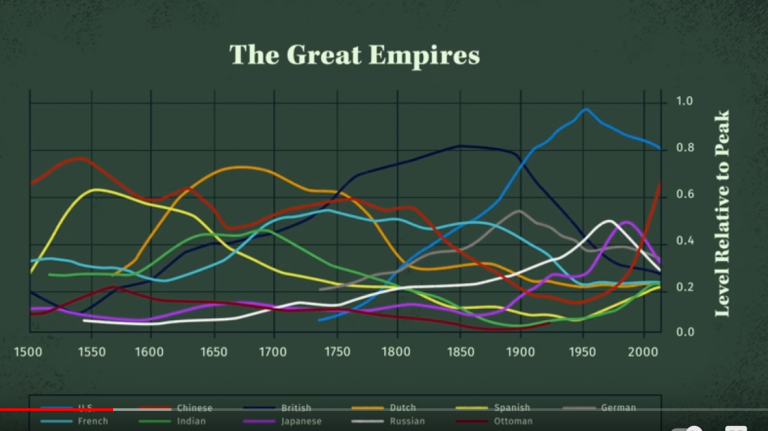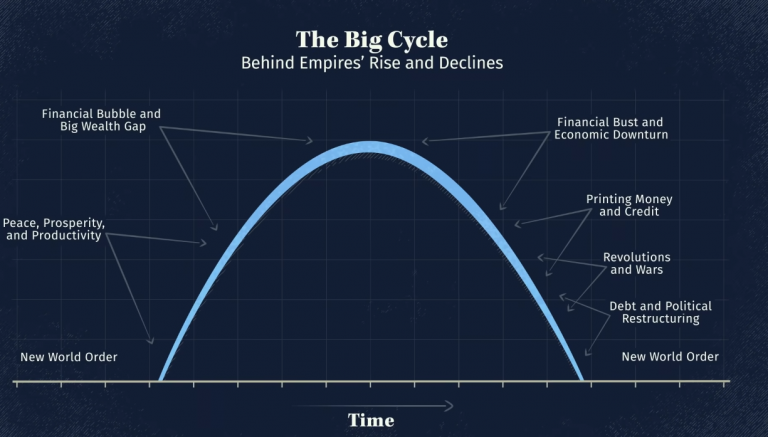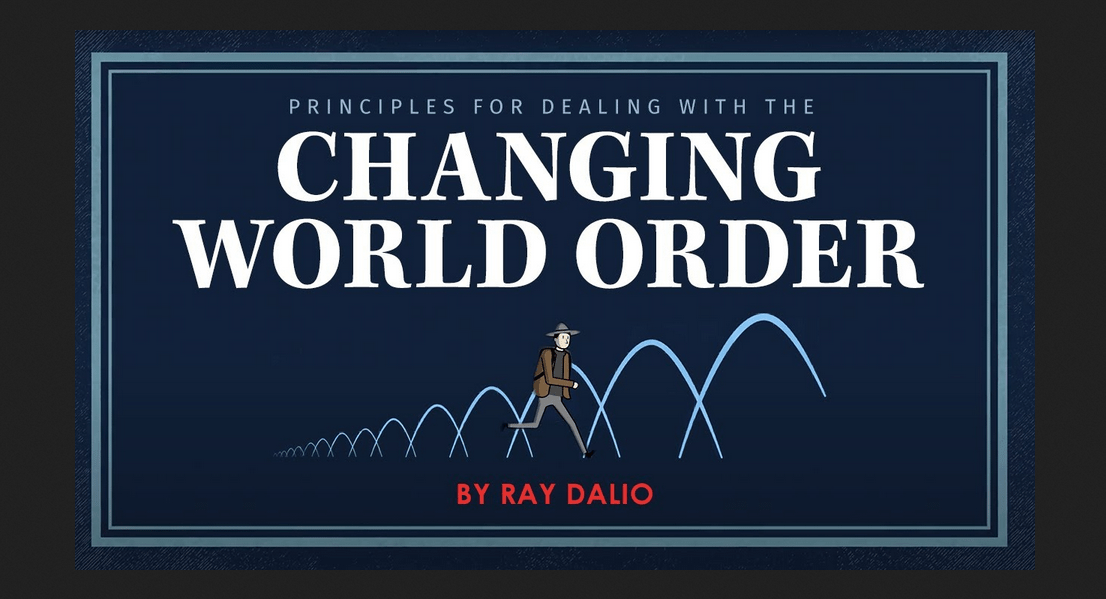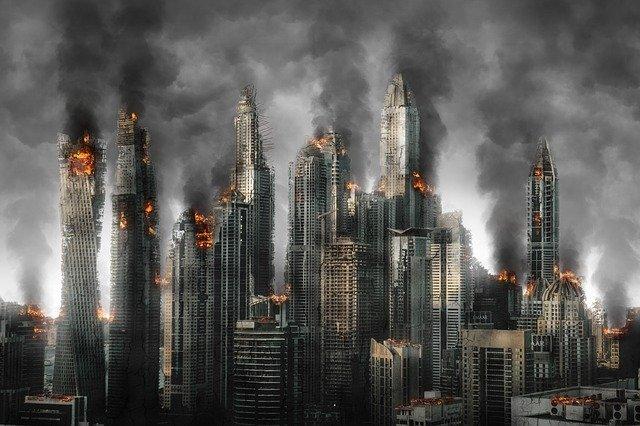Ray Dalio’s Principles of a Changing World Order
Today I want to talk about Ray Dalio, his research on global macro-economic history and how this relates to the entire premise of my site.
Who is Ray Dalio?
Ray Dalio is a 70-something billionaire investor and hedge fund manager. He founded the world’s largest hedge fund (Bridgewater Associates) and is widely regarded as one of the leading voices in the world of finance.
He has written several books, of which his newest book The Changing World Order: Why Nations Succeed and Fail is, in my opinion, by far the most interesting.
This will be the main topic of today’s article.
While I would recommend you read the whole book, you could also just watch a well-made YouTube video narrated by Ray Dalio himself, which explains the core concepts of his book and his research:
If you can’t be arsed with either, I’m going to give you a rather brief summary of the ideas espoused in Dalio’s work.
At the end of the article, I’ll give you my thoughts.
Check out my new book, available on Amazon!
Get the bookThe Changing World Order
Dalio starts by stating that the times ahead will be radically different from what we’ve seen in our lifetimes, but that they have occurred again and again over the course of history.
He refers mostly to economic conditions, such as the mass printing of money, large debt, inflation, internal strife, civil unrest and the emergence of a new superpower (China).
If you’ve read my reasons for why the West is collapsing, most of this won’t be news to you.
More specifically, in the last 500 years mankind has encountered similar situations with the Dutch and British Empires, and the US Empire is currently in the last phases of its lifecycle.
A short contemporary history of the US
The United States is the current de facto world leader.
Its currency, the dollar, is used as a reserve currency, the US has the largest economy in the world (this will not last long), the largest military might, and serious global clout.
But it’s an empire in decline.
While there are a great number of factors contributing to this, many people (including me) would certainly point to 1971 as a turning point.
In that year, the US ran out of money and defaulted on its debt.
Up until this point, gold was money used in transactions between countries. Paper money could be exchanged for gold, which is what gave it its value.
But the US was spending more than it was earning, and they had more paper money than they had gold.
The amount of gold in the US dwindled, which led to a gold rush of people exchanging their worthless paper for actual gold.
To stop this drainage of the national gold reserve, Dick Nixon stopped the convertibility of the dollar into gold.
This is a currency devaluation, which means the dollar was suddenly worth less.
For people in that generation, this was an unprecedented event.
However, the same thing happened in 1933 with president Roosevelt.
Such currency devaluation allowed the US to spend more money than it earned, and the value of each dollar fell.
This caused the price of gold, stocks and commodities to rise.
Similar situations occurred in 2008 and 2020.
Changing orders
Money lies at the core of a civilization’s strength, and you can tell how an empire is doing based on its currency.
It also directs the status quo and changes of “orders”.
An “order” in this context refers to how people deal with each other.
You have internal orders, which describe national situations, and you have a world order, which is how countries deal with each other and which ones are at the top.
Orders usually change after drastic events, such as wars.
There are three factors which almost always precipitate a change in order:
- Money printing: Central banks print loads of money
- Wealth gap: Big internal conflicts due to growing gaps in wealth and values, political polarization between right and left
- Rising rival power: External conflict between leading and rising global power (for example, the US and China)
All of these have happened many times before, and they have always led to changing world orders.
The last conflict in 1945 led to the allied victory and the current world order, and the US emerged as the dominant world power.
A new world monetary system was laid out in the conference at Bretton Woods, and it established the USD as the world’s reserve currency – granting the US tremendous power and allowing it to prosper.
Other examples include:
- US: a new internal order started in 1789, with its Constitution
- Russia: the end of the tsar-era in 1917, which lasted until 1991
- China: the rise of the Communist Party in 1949 ushered in the current order
Once a new dominant power and monetary system are established, a new world order begins.
This is a timeless and universal cycle, and can be seen in many other empires.
Empires of the past
Dalio investigated several great empires of the past:
- Indian
- French
- Japanese
- Russian
- Spanish
- Ottoman
- German
In all of these, the same cycle occurred, but Dalio looked specifically at the most recent and most important global empires and their currency:
- The Dutch and the guilder
- The British and the pound
- The US and the dollar
- The Chinese and the yuan
Yes, the Dutch. This may come as a shock to you, but the Dutch (Holland, the Netherlands) used to rule large parts of the world, and their currency was the world’s most commonly used form of money.
Now? They’re still around, but they’re mostly irrelevant, and this is a probable destination for the US in the next century.

These empires come and go in overlapping cycles which last about 250 years, of which there are 10 to 20 years of transition (periods of conflict, because the former leading powers don’t go down easily).
The US is currently nearing, or in many regards is already in, its decades of transition.
The Big Cycle
To measure an empire’s power, Dalio looked at 8 indicators of its strength:
- Education
- Innovation and Technology
- Competitiveness
- Output
- World Trade
- Military
- Financial Center
- Currency reserve status
These 8 can be used to measure how strong a country is now, used to be in the past, and to see if it is rising or declining.
Putting these factors together and applying them to the empires, Dalio proposes a “Big Cycle” which lies behind the rise and decline of empires:

Every cycle begins after a major conflict, which is most often a war of some sort (or a revolution). This conflict then establishes a new leading power and sometimes even a new world order.
Thus begins a period of peace and prosperity, because nobody wants to take on the current reigning champion and the former top dogs are licking their wounds.
This period is great for productivity, with the currency of the new superpower becoming the world’s reserve currency, and people bet on this situation continuing.
They increasingly borrow money, which leads to a financial bubble.
The wealth gap grows, because the returns of such productivity of course do not come equally to all, and the rich get richer.
Of course, at some point the bubble bursts, which leads to an economic downturn, which leads to the printing of money.
Internal conflicts between rich and poor (and between ideologies) increase, which ultimately end in revolution and civil war within a nation.
The empire’s power diminishes opposed to rival powers, who of course take advantage of this situation.
External conflicts (wars) take place, and new winners and losers emerge.
The winners create a new world order, and the cycle begins again.
The status of an empire
You can measure/guess an empire’s longevity by looking at its vital signs, such as:
- Leadership capabilities
- Education levels
- Character/determination
- Rule of law
- Corruption
- Resource allocation efficiency
- Openness to global thinking
You can use these factors to see which stage a country is in.
Generally speaking, there are 3 large phases in the Big Cycle: the Rise, the Top and the Decline.
To Rise, a country needs to be united, and the government needs to be strong, and working together with the military and the capitalists.
These successive generations of strong leaders create an empire and the systems to preserve it.
However, the descendants of these leaders never had to struggle, and are used to the good times.
At the Top, this leads to decadence, self-reinforcing wealth gaps, and a strong divide in values, politics and opportunities between citizens.
Resentment grows, but as long as the overall situation is still positive and everyone is seeing some increase in lifestyle, the powder keg doesn’t explode.
When an empire it at its peak, it always overextends. It becomes active in too many things, over the entire world, and it cannot keep financing these endeavors.
Currently, the US spends trillions on its military, with a presence in over 70 countries.
To keep up with these expensive endeavors, the richer empire has to get into debt by borrowing from poorer countries – which earn less, but save way more because they do not have such massive expenses.
The US has borrowed trillions of dollars from China, which is an early sign of a power shift.
Finally, the Decline of an empire is marked by internal economic weakness, infighting, and costly external fighting.
At first, the decline comes gradually, and then it happens suddenly.
One might even say it collapses.
An economic downturn occurs, the empire cannot borrow more and the financial bubble bursts.
Massive printing of money ensues, which further devalues the currency.
For the US, in our lifetimes (on average, unless you’re 50-60+) we’ve seen 3 cycles of debt, finance, booms and busts:
- Dot Com bust
- Mortgage crisis
- Pandemic crisis
Each time, the Central Bank had to step in with stronger measures, and each time the next crisis was worse.
How many more of these do you think the US economy can take?
Signs of the decline
A decline of an empire can be seen in many factors, such as:
- The government has problems funding itself
- Bad economic conditions (such as inflation)
- Declining living standards (homelessness)
- Large wealth and values gaps
- Political polarization
- Internal conflict between the rich and the poor, between different ethnic, religious and racial groups (BLM)
- Political extremism, often seen in populism (Trump)
These things often lead to an increase of taxes on the rich, who of course move to assets, currencies and places they feel safer in.
The wealthy flee the country, further decreasing a government’s tax income.
At this point, the government is likely to intervene and impose harsh penalties.
Democracy fails, people have had enough of this shit, and the move to a strong leader is very likely.
Some form of revolution or civil war will be needed to change the order. This is often violent, but it doesn’t have to be.
All of this internal conflict makes an empire weak and vulnerable to rival powers, which raises the risk of great international conflict – such as Russia taking liberties it wouldn’t have taken 20 years ago.
Wars realign the new orders to the new realities of wealth and power in the world.
When those holding the current reserve currency of the declining empire lose faith and sell it, the end of the cycle has been reached and a new world order is imminent.
The future
As you can tell from many of the referrals to the US I’ve made throughout the article, this empire is very much in its declining phase – the collapse of the West.
While it still hasn’t reached the end of the cycle, it does have massive debt, spends more than it earns (more often than not on bullshit), and it funds this deficit with more borrowing, and printing huge amounts of money.
- Inflation hasn’t yet reached massive levels, but it will
- The massive international selling-off of dollars has not yet begun, but it will
- The US is always involved in plenty of internal and external conflicts, but not yet in a deciding one, but itwill
Dalio ends his book and video with a relatively positive note, stating and indicating that perhaps the US, the West, can be saved by making the hard decisions needed to extend the cycle.
I am very, very skeptical about this.
Every factor of an empire’s decline seems present in the US, and I really cannot see any reversal in its decline.
Sure, it can and probably will limp on for a few more decades, artificially propped up by all kinds of economic and technological crutches, but this is just prolonging the end.
The empire of the US (and the West by extension) has risen to never before seen heights, and its decline and inevitable collapse will cause great turmoil and problems for a large number of people all over the world.
What to do about it?
Over the course of his book, Dalio gives several Principles for dealing with the Changing World Order:
- When central banks print a lot of money: buy stocks, gold and commodities, because their value will rise, and the value of paper money will fall
- To understand what is coming at you, you need to understand what happened before you
- A Nation’s greatest war is with itself
- Earn more than we spend and treat each other well
There are some real pearls of wisdom in there, especially earning more than you spend, study history, and invest instead of save paper money.
However, I would propose another principle, one I think is more pragmatic:
You cannot stop the decline of an empire. You cannot do anything to prevent the West from collapsing. The only thing you can do is get out and look after yourself.
You can do this by:
- Planting your flags in various, non-Western countries, so you are flexible where you can live
- Having several sources of self-employed, location independent, international income, so you are not relying on a job or a pension, and nobody can take away your livelihood
If you have these two factors nailed down, you will be better off than 99% of people in the Western world in the coming decades.
I don’t think the West will collapse next year, but it very well might.
Inflation in Europe is reaching double digits in many countries, debt has never been higher, Russia’s taking liberties and China will not be far behind.
How long before it attacks Taiwan, or how long before North Korea decides to throw a nuke somewhere, forcing the US to overplay its hand, leading to a global conflict it cannot win?
Don’t bet on having plenty of time to get your shit in order.
Get started now. Work on your location independent income, and escape the West before it’s too late.
Check out my new book, available on Amazon!
Get the book

